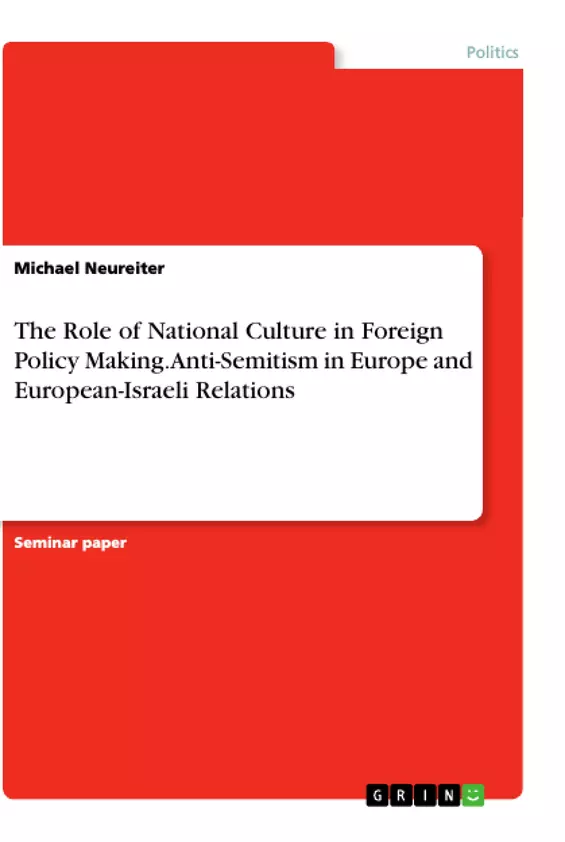Over the last decades, the foreign policies of the European Union member countries have become more and more consistent. However, up to date, the European countries differ significantly in their views on Israel, Palestine and the Middle East conflict. This study tries to explain these differences by focusing on a factor that has been largely ignored by existing literature on foreign policy making: culture. More precisely, this study tests the argument that anti-Semitism as a cultural trait influences a state´s foreign policy toward Israel. In order to test this argument, we are examining the levels of anti-Semitism in five European states (France, Germany, Italy, Spain and the United Kingdom) as well as the quality of their relations with Israel. The findings suggest that the countries with the highest levels of anti-Semitism indeed have the worst relations with Israel and vice versa. Thus, anti-Semitism (and, more generally, culture) seems to be an important factor that deserves greater attention from scholars that are trying to understand the process of foreign policy making.
Inhaltsverzeichnis (Table of Contents)
- Abstract
- Introduction
- Literature Review
- EU Foreign Policy Making
- EU Policies toward Israel
- Culture´s Influence on Foreign Policy
- Culture and Anti-Semitism
- Methodology
- Case Studies
- United Kingdom (UK)
- France
- Germany
- Italy
- Spain
- Discussion
- Conclusion
Zielsetzung und Themenschwerpunkte (Objectives and Key Themes)
This study examines the differences in foreign policy approaches of European Union member states towards Israel, focusing on the role of anti-Semitism as a cultural factor. The research aims to demonstrate how anti-Semitism influences a state's foreign policy toward Israel and explores the extent to which this cultural trait shapes European-Israeli relations.
- The influence of national culture on foreign policy making
- The impact of anti-Semitism on European-Israeli relations
- The role of culture in shaping foreign policy decisions
- The analysis of anti-Semitism as a cultural trait
- The application of case study methodology to examine five European countries
Zusammenfassung der Kapitel (Chapter Summaries)
The introduction sets the stage by highlighting the inconsistency in European Union member states' foreign policies toward Israel, Palestine, and the Middle East conflict. It then introduces the central argument of the study: that anti-Semitism as a cultural trait influences a state's foreign policy toward Israel.
The literature review delves into existing research on EU foreign policy making, EU policies toward Israel, and the broader influence of culture on foreign policy. It explores the theoretical arguments and empirical evidence suggesting that culture, including anti-Semitism, significantly impacts foreign policy decisions.
The methodology section explains the choice of case study approach and outlines the selection of specific cases, namely the United Kingdom, France, Germany, Italy, and Spain. It also clarifies the sources used in the research.
Each case study section provides a detailed analysis of the chosen countries, examining their relations with Israel and exploring the correlation between the level of anti-Semitism within each nation and the quality of their relationship with Israel.
Schlüsselwörter (Keywords)
This study focuses on the interplay of anti-Semitism, national culture, and foreign policy, particularly in the context of European-Israeli relations. Key themes include cultural influences on foreign policy making, the impact of anti-Semitism as a cultural trait, the application of case study analysis, and the exploration of European Union member states' divergent foreign policy strategies toward Israel.
Frequently Asked Questions
How does national culture affect foreign policy?
National culture, including historical biases and cultural traits, can significantly shape a state's diplomatic priorities and its relations with other nations.
What is the link between anti-Semitism and European-Israeli relations?
The study suggests that European countries with higher levels of anti-Semitism as a cultural trait tend to have more strained diplomatic relations with Israel.
Which European countries were examined in this study?
The research focuses on case studies from France, Germany, Italy, Spain, and the United Kingdom.
Why do EU member states differ in their views on the Middle East conflict?
Despite consistent EU frameworks, divergent national histories and cultural factors lead countries to adopt different positions on Israel and Palestine.
What is the role of anti-Semitism as a "cultural trait"?
The study treats anti-Semitism not just as individual prejudice but as a persistent cultural factor that can influence institutional foreign policy making.
- Citar trabajo
- Michael Neureiter (Autor), 2011, The Role of National Culture in Foreign Policy Making. Anti-Semitism in Europe and European-Israeli Relations, Múnich, GRIN Verlag, https://www.grin.com/document/962207



